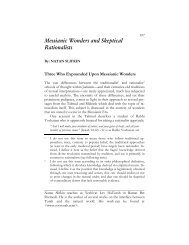Is There a Disconnect between Torah Learning and ... - Hakirah.org
Is There a Disconnect between Torah Learning and ... - Hakirah.org
Is There a Disconnect between Torah Learning and ... - Hakirah.org
Create successful ePaper yourself
Turn your PDF publications into a flip-book with our unique Google optimized e-Paper software.
דצ<br />
46 : Hạkirah, the Flatbush Journal of Jewish Law <strong>and</strong> Thought<br />
R. Epstein (Baruch Sh’amar on Pirkei Avot) points out that there is no<br />
brakhah on charity, returning a lost item, etc. because these are all<br />
comm<strong>and</strong>ments that are universal—they apply to gentiles as well. It<br />
therefore makes no sense to say Asher Kiddishanu, that he made us holy<br />
(i.e., unique or separate), when we perform these mitzvos.” Another<br />
reviewer, who had read this reviewer’s notes, responded, arguing that<br />
“It is true that middos are universal, but with us it is metzuvah ve’osseh <strong>and</strong><br />
therefore brings kedusha. Parshat Kedoshim starts with ish imo ve’aviv tira’u,<br />
which I assume you consider universal.” Although the second reviewer<br />
clearly made the point, the first reviewer remained unconvinced, based<br />
אשר קדשנו on the Baruch She’amar’s explanation of why we do not say<br />
on mitzvos like . In accordance with the importance I attach במצותיו<br />
to this question, I feel I must respond <strong>and</strong> elaborate on the issue.<br />
The question of why we do not say ברכות on certain מצוות is extensively<br />
discussed by rishonim <strong>and</strong> acharonim (see<br />
"<br />
In fact the Rashba gives a different answer to this question. The<br />
.(שו ת הר צבי מילי דברכות סימן ב<br />
הרמ ע מפאנו<br />
קה<br />
Boruch She’amar’s answer is actually that of the " . Be that as<br />
it may, the question of whether we make a ברכה has no bearing on the<br />
question of whether מצוות בין אדם לחבירו have .קדושה They definitely<br />
הלכות דעות do, as I argue <strong>and</strong>, I hope, show, in my article. Rambam in<br />
bases middos on the מצווה of במדותיו !הדבק Would anyone suggest that<br />
?קדושה has no<br />
Furthermore, we need to remember that there are various levels of<br />
הכרמל דף רצ As the Malbim (cited in .קדושה<br />
) explains, the word קדוש may be applied to any one of<br />
many levels of separation <strong>and</strong> elevation. At a primary level it refers to<br />
man’s separation from base behaviors, from materialism, <strong>and</strong> from<br />
allowing one’s behavior to be determined <strong>and</strong> guided by physical drives<br />
of the moment. One elevates himself to loftier levels by placing his<br />
behavior under the control of his conscious mind <strong>and</strong> the rational,<br />
ethical, <strong>and</strong> moral choices his mind makes. Some מצוות serve to<br />
separate us from the nations of the world. Others apparently don’t have<br />
that specific property, but they still separate us <strong>and</strong> elevate us above<br />
that which is base. All the ברוך שאמר is saying is that universal ethical<br />
practices that are meant to be practiced by בני נח as well do not have<br />
the specific status of קדושה that separates us from the nations of the<br />
world, but they certainly do have !קדושה In fact the ברוך שאמר makes<br />
איה "ש תקט"ו ויקרא from "ז<br />
י"ט סי' ב וסי' ק<br />
his comment on the statement by רבי חנניא בן עקשיא that<br />
. The ברוך שאמר says that the<br />
" refers to the “universal” mitzvos that we would have arrived at<br />
רצה הקב "ה<br />
לזכות את ישראל, לפיכך הרבה להם תורה ומצוות<br />
"הִרְבָּה
















